New Delhi: The Delhi High Court on Tuesday granted bail to JNU student Natasha Narwal in the 2020 riots ‘conspiracy’ case, saying terror laws cannot be applied in a “cavalier manner” and the line between the right to protest and terrorist activity is getting blurred as also that it will be a sad day for democracy if this mindset gains traction.
A Bench of Justices Siddharth Mridul and Anup Jairam Bhambhani admitted her on a regular bail on furnishing a personal bond of Rs 50,000 each along with two sureties of the like amount. The court also granted bail to two more student activists in the case.
While granting her relief, the bench opined, It seems, that in its anxiety to suppress dissent, in the mind of the State, the line between the constitutionally guaranteed right to protest and terrorist activity seems to be getting somewhat blurred. If this mindset gains traction, it would be a sad day for democracy.”
Furthermore, the court stated that the allegations relating to inflammatory speeches, organising ‘chakka jaam’, instigating women are evidence that she participated in organising protests, but there is no specific allegation that she incited violence.
We can discern no specific or particularised allegation, much less any material, that the appellant incited violence, what to talk of committing a terrorist act or a conspiracy or act preparatory to the commission of a terrorist act as understood in the UAPA, the judges said in a 72-page judgement.
Narwal, who was arrested in May 2020, has been directed to surrender her passport and not to travel out of the country without permission of the trial court or contact prosecution witnesses or other persons acquainted with the facts of the case or tamper with evidence.
The case pertains to the alleged ‘conspiracy’ to incite the riots, which had left 53 people dead and hundreds injured in north-east Delhi in February last year.
Narwal, along with 17 others, are accused in the case.
A student pursuing MPhil-PhD Programme from the Jawaharlal Nehru University, Narwal has been accused of various offences under the Indian Penal Code, Unlawful Assembly (Prevention) Act, Indian Penal Code, Arms Act and Prevention of Damage to Public Property Act.
The court said no offence under sections 15 (terrorist act), 17 (punishment for raising funds for terrorist act) or 18 (punishment for conspiracy) of the UAPA is prima facie made-out against Narwal in the case based on the charge-sheet and the material collected and cited by the prosecution.
It said that although the definition of ‘terrorist act’ in section 15 of the stringent Unlawful Activities (Prevention) Act (UAPA) is wide and somewhat vague, it must partake the essential character of terrorism and the phrase ‘terrorist act’ cannot be permitted to be applied in a cavalier manner to criminal acts that squarely fall under the IPC.
Keeping in view the background, profile and position of the appellant, there is no reasonably discernible basis to suspect, nor do we entertain any reasonable apprehension, that the appellant will either flee from justice; or that she will tamper with evidence; or that she will intimidate witnesses or otherwise attempt to frustrate trial, the high court said.
It noted that the charge sheet was filed on September 16, 2020 and there are 740 prosecution witnesses and the trial is yet to commence which is unlikely to begin soon in view of the truncated functioning of courts because of the prevailing second wave of the COVID-19 pandemic.
In the charge sheet, the police have claimed that the clashes were part of a “pre-planned and premeditated conspiracy”.
It showed screenshots of purported WhatsApp messages exchanged by student activists, as well as their Facebook posts, to establish their complicity in the alleged conspiracy.
Narwal is an accused in a total of three cases related to Delhi riots. She has now been granted bail in all the cases. Besides her, the court has granted bail to JNU student Devanagana Kalita and Jamia Millia Islamia student Asif Iqbal Tanha.

